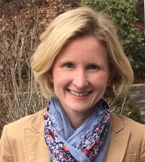In response to an evolving federal research funding landscape, InCHIP is working to expand support and resources for principal investigators.

On Friday, May 30, UConn's Institute for Collaboration on Health, Intervention, and Policy (InCHIP) will hold a virtual coffee break for faculty to receive updates on the evolving federal research funding landscape and guidance for writing competitive grant applications in the current climate.
The event will feature a panel of InCHIP principal investigators (PIs) who have submitted a federal funding proposal this year. In addition, leaders from InCHIP and the Office of the Vice President for Research will share advice from program officers at the National Institutes of Health and answer questions about the impact of federal funding on the university.
Information for the upcoming coffee hour can be found on InCHIP's website, chip.uconn.edu.
This event is part of InCHIP's recurring coffee hours, which provide faculty a space to informally discuss their experiences with federal funding changes and create a network of support.

"These events are important for us to get an idea of how changes in federal funding are affecting faculty and how InCHIP can support PIs and their research," says Caitlin Caspi, associate director of InCHIP and director of Food Security Initiatives at the UConn Rudd Center for Food Policy and Health.
Faculty from UConn Storrs, UConn Health, regional campuses, and various schools and colleges have participated, highlighting strong interest and demand for these events.
Caspi spearheaded the coffee hours in response to unprecedented funding cuts at the National Institutes of Health (NIH). According to the Association of American Medical Colleges (AAMC), about $1.9 billion in research and career development funding to U.S. institutions has been terminated. AAMC data shows that Connecticut has lost more than $12 million in NIH funding.
Scientific research is a core component in the economic engine of Connecticut and the United States. Government-funded research also fuels cures for debilitating diseases and innovation.
A 2019 study published in Science by researchers at the University of California, Berkely, the University of Connecticut, Boston University, and Harvard University quantified the impact of federal research dollars on patents. The authors found that nearly one-third of U.S. patents rely on federal research dollars and established that corporations have become more reliant on government investment.
In addition to the impacts on innovation, the cuts have socioeconomic implications. As the largest public funder of biomedical research, the NIH provided key support for research that improves public health and well-being, especially for historically understudied populations and fields.
Grant terminations have most heavily impacted research areas like HIV/AIDS, sexual and gender minorities, COVID-19, and climate science – many of which are InCHIP priorities. In response, leadership is working to expand support for investigators beyond the coffee hours.
First, InCHIP continues to offer seed grant funding to support innovative pilot research that will serve as the foundation for future external funding proposals.

"InCHIP seed grants support innovative pilot research in emerging areas and PI career growth. In unstable financial times, these internal funding opportunities can act as lifelines to keep research moving forward," says Tricia Leahey, director of InCHIP.
For the Spring 2025 semester, InCHIP offered internal funds for projects that aim to address health challenges and concerns affecting understudied populations in Connecticut and the United States.
Specifically, InCHIP has partnered with the UConn Gladstein Family Human Rights Institute to fund projects that explore the areas of health equity, human rights, and social justice. InCHIP expects to fund 2 projects under this opportunity.
InCHIP also offered seed grants in environment and health, community-engaged research, and women's health, along with core funding for career development, and team formation, bridge funding, and project completion.
The spring application cycle has closed, but investigators are encouraged to check InCHIP's website during the fall semester.
InCHIP is also supporting PIs who received award termination from the NIH, from navigating logistics to providing financial support. In addition, InCHIP is helping PIs navigate the changing funding landscape through grant writing workshops and identifying non-federal funding sources.
Next semester, InCHIP will offer a grant writing workshop focused on foundation opportunities. The goal of the workshop is to help PIs learn best practices for crafting competitive proposals. Modeled after InCHIP's Spring 2025 NIH grant writing bootcamp, the workshop builds on this semester's successful bootcamp and follow-up seminar, which is providing researchers hands-on experience and in-depth feedback on their grant proposals.
Details about the foundation grants workshop will be announced on InCHIP's website.






